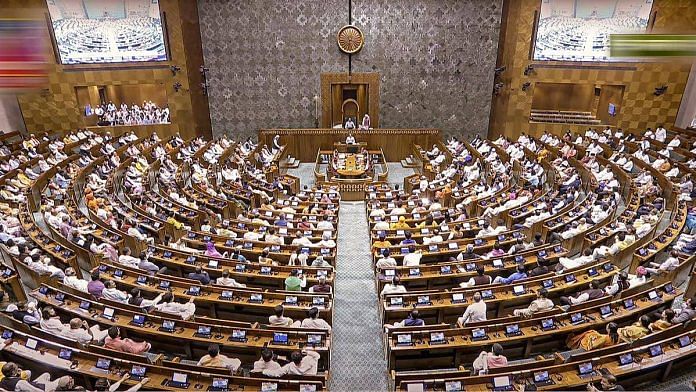New Delhi: The BJP’s Mohan Mandavi and Bhagirath Chaudhary were the only two MPs who attended all sessions of the 17th Lok Sabha over the last five years, shows data released by non-profit PRS Legislative Research.
Only a quarter of all MPs — including the Nationalist Congress Party’s (NCP’s) Supriya Sule, the Biju Janata Dal’s (BJD’s) Pinaki Misra, the Congress’s Manish Tewari, and the BJP’s Nishikant Dubey — had over 90 percent attendance.
Among the MPs with the worst attendance were BSP MP Atul Kumar Singh (1.5 percent), TMC MP Abhishek Banerjee (15 percent), BJP MP and Bollywood actor Sunny Deol (17 percent), Shiromani Akali Dal chief Sukhbir Singh Badal (20 percent), and TMC MP and Bengali actress Nusrat Jahan (23 percent).
Congress MPs Sonia Gandhi and Rahul Gandhi logged 49 percent and 51 percent attendance, respectively.
“A member is considered present if he signs the attendance register. If a member was present on a particular day but did not sign the attendance register, he is considered absent,” according to PRS.
On average, MPs, excluding those who served as ministers for the entire term and the Speaker and falling outside the purview of the attendance records, logged 79 percent attendance during the 17th Lok Sabha.
A special parliamentary session the government convened in September last year, when the Women’s Reservation Bill (The Constitution 108th Amendment Bill, 2008) got passed, saw the highest attendance — 92 percent. The government had surprised everyone with the announcement of the session, the first in the new parliament building, which brought in the Opposition leaders.
Despite the COVID-19 pandemic, attendance did not fall below 70 percent in any of the sessions, except the Budget Session 2021, which saw a 69 percent attendance.
Also read: Lok Sabha passes women’s reservation bill 454 to 2 — Amit Shah says ‘quota after 2029’
Not a single question asked by Sonia Gandhi, Akhilesh Yadav
On average, the MPs participated in 45 debates during the period.
Two-time BJP MP from Hamirpur, Uttar Pradesh, Pushpendra Singh Chandel participated in the highest number of debates — 1,194, followed by Congress’ Kuldeep Rai Sharma, and BSP’s Malook Nagar.
A total of 14 MPs did not participate in a single debate. Among them were former Union ministers Maneka Gandhi and Ramesh Pokhriyal Nishank, TMC’s Shatrughan Sinha, BJP’s Anant Kumar Hegde and Sunny Deol.
Debates are an integral part of a democratic parliament. “Members across political parties participate in debates on government business such as government bills and budgets. MPs also initiate and participate in discussions on various issues of public interest,” the PRS noted.
“In addition to speaking on issues or raising them, MPs may associate with debates initiated by others to indicate their support for the issue raised,” it added.
A state-wise look showed that out of 46 MPs from Rajasthan and Kerala, including those elected through by-polls, each participated in 77 debates on average, a higher participation than from any other states that have sent at least 20 MPs.
A party-wise count showed that an average BSP MP participated in the most debates among leaders from parties with at least five MPs, followed by the NCP and the Congress.
On average, MPs with a postgraduate degree participated in 59 debates, graduates in 47 debates, and those with educational qualifications up to higher secondary in 34 debates only. The PRS pointed out that Lok Sabha MPs with higher education tend to participate in more of such debates.
MPs from Maharashtra, who asked 370 questions each on average, were the most active in asking questions compared to MPs from other states that sent at least 10 MPs. Six of the 10 MPs asking the most questions were from Maharashtra. Questions help MPs get answers from the government.
MPs who are ministers and represent the government during debates and the Speaker do not ask questions or introduce private member bills as reflected in the party-wise analysis. On average, MPs from two regional parties — Shiv Sena and NCP — asked the maximum questions among leaders from political parties with at least five MPs. The analysis considered the undivided Shiv Sena and NCP.
BJP’s Sukanta Majumdar (aged 44) asked the most questions — 654, and Shiv Sena’s Shrirang Appa Barne (59) and BJP’s Sudhir Gupta (64) asked 635 questions each. According to PRS, younger MPs usually ask more questions than those in the 60-plus age group.
Meanwhile, 24 MPs did not ask a single question. They include Sonia Gandhi (77), BJP leaders and former Union ministers Ravi Shankar Prasad (69) and Sadanand Gowda (70), and SP leader and former MP Akhilesh Yadav (50).
Younger MPs asked 226 questions on average, while older ones asked 180.
MPs who have served six or more terms asked about 106 questions on average. On average, first- and second-term MPs asked 199 and 244 questions, respectively. An MP with fewer terms tends to ask more questions on average, according to PRS.
MPs introduced 729 private member bills in the 17th Lok Sabha. However, 73 percent of MPs did not introduce any such bills. BJP’s Nishikant Dubey and Gopal Chinayya Shetty introduced the maximum bills — 19.
(Edited by Madhurita Goswami)
Also read: Half of bills passed by 17th Lok Sabha discussed for less than two hours each: Report



